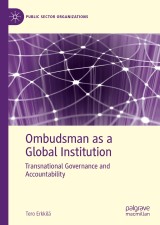Details

Ombudsman as a Global Institution
Transnational Governance and AccountabilityPublic Sector Organizations
|
CHF 100.50 |
|
| Verlag: | Palgrave Macmillan |
| Format: | |
| Veröffentl.: | 27.02.2020 |
| ISBN/EAN: | 9783030326753 |
| Sprache: | englisch |
Dieses eBook enthält ein Wasserzeichen.
Beschreibungen
This book explores the ombudsman as a global institution. It has spread all over the world and its institutional development is increasingly being governed transnationally. Initially an institution of administrative law, the ombudsman has become a human rights institution and institution of good governance. These ideational shifts have influenced the global diffusion of the ombudsman but also the way in which this institution of accountability functions. The ombudsman is a peculiar institution of public accountability - both an institution and individual - that observes changes in the general political climate and engages in renegotiations of its intra-institutional position. The global models associated with the ombudsman are a source of organizational ideas, legitimacy, and sense of orientation, but they treat institutional actors differently, working also as mechanisms of inclusion and exclusion. The book tracks the global diffusion and institutional evolution of the ombudsman. Itschapters on institutional cases further explore the joint institutional history of the Parliamentary Ombudsman and the Chancellor of Justice in Finland, and the European Ombudsman.
<div>Chapter 1 Ombudsman as Global Institution.- Chapter 2 Transnational Governance and Global Diffusion of the Ombudsman Institution.- Chapter 3 Institutional History of the Ombudsman and Chancellor of Justice in Finland.- Chapter 4 The Finnish Parliamentary Ombudsman, the Chancellor of Justice, and Institutional Change.- Chapter 5 European Ombudsman as Supranational Institution of Accountability.- Chapter 6 European Ombudsman and Institutional Change.- Chapter 7 Conclusions.</div>
Tero Erkkilä is Associate Professor of Political Science at the University of Helsinki, Finland. His previous books include <i>Government Transparency</i>, <i>Global University Rankings</i>, <i>Public Administration</i> (with B. Guy Peters and Patrick von Maravic) and <i>Global Knowledge Governance</i> (with Ossi Piironen).
This book explores the ombudsman as a global institution. It has spread all over the world and its institutional development is increasingly being governed transnationally. Initially an institution of administrative law, the ombudsman has become a human rights institution and institution of good governance. These ideational shifts have influenced the global diffusion of the ombudsman but also the way in which this institution of accountability functions. The ombudsman is a peculiar institution of public accountability - both an institution and individual - that observes changes in the general political climate and engages in renegotiations of its intra-institutional position. The global models associated with the ombudsman are a source of organizational ideas, legitimacy, and sense of orientation, but they treat institutional actors differently, working also as mechanisms of inclusion and exclusion. The book tracks the global diffusion and institutional evolution of the ombudsman. Itschapters on institutional cases further explore the joint institutional history of the Parliamentary Ombudsman and the Chancellor of Justice in Finland, and the European Ombudsman. <div><br></div><div>Tero Erkkilä is Associate Professor of Political Science at the University of Helsinki, Finland. His previous books include <i>Government Transparency</i>, <i>Global University Rankings</i>, <i>Public Administration</i> (with B. Guy Peters and Patrick von Maravic) and <i>Global Knowledge Governance</i> (with Ossi Piironen).<br></div>
Examines the ombudsman as a global institution that has spread all over the world and whose institutional development is increasingly being governed transnationally Argues that the ombudsman is a peculiar institution of public accountability – both an institution and individual – that observes changes in the general political climate but also engages in a constant renegotiation of its intra-institutional position, potentially involving conflicts over its institutional mandate Further argues that the global models associated with the ombudsman are a source of organizational ideas, legitimacy, and sense of orientation, but they treat institutional actors differently, working also as mechanisms of inclusion and exclusion
Diese Produkte könnten Sie auch interessieren:

Mapping Sustainability

von: Nazli Choucri, Dinsha Mistree, Farnaz Haghseta, Toufic Mezher, Wallace R. Baker, Carlos I. Ortiz

CHF 118.00

Fertility, Living Arrangements, Care and Mobility

von: John Stillwell, Ernestina Coast, Dylan Kneale

CHF 118.00














